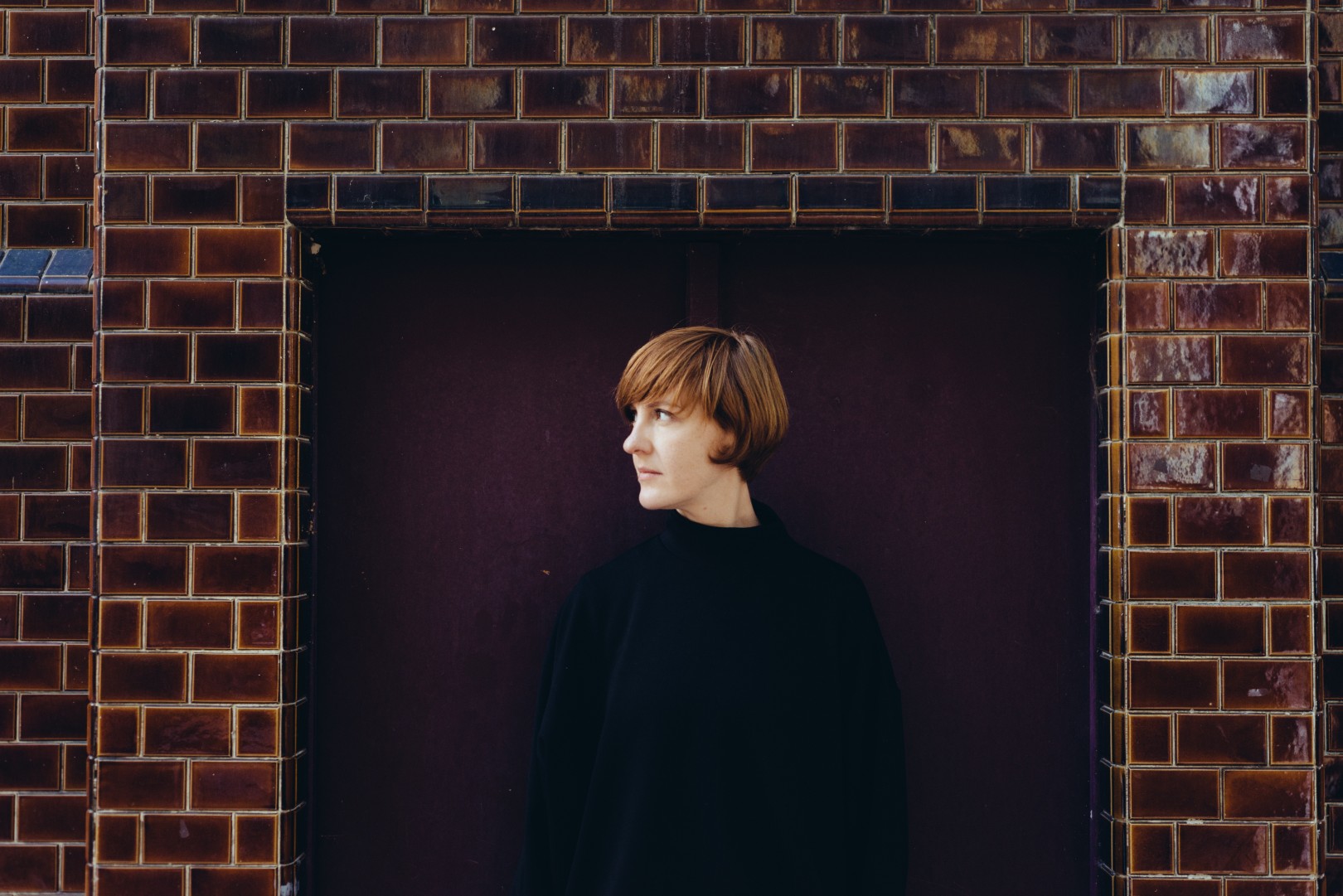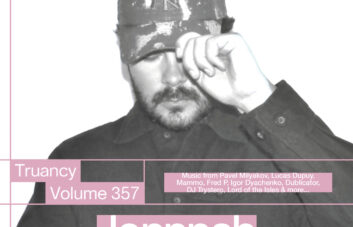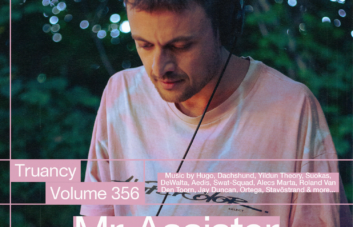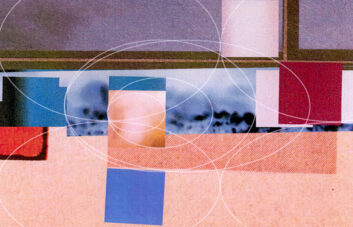Nadine Moser has spent many years being involved in music in many ways – as a fan, DJ, booker, organiser and activist. Under the name resom, her way of playing records is grounded in zeroing in on their subtleties and weaving together rich and diverse tapestries of sound, an approach well represented in her Truancy Volume. Her wealth of experience and thoughtful nature also become apparent in the wide-ranging interview below in which she discusses her relationship with radio, her music history and the possibilities, limits and challenges in political organising within dance music.
Some of your radio shows have this quality of being simultaneously very specific in terms of overarching themes – the format of radio itself or television show music for example – while also being very diverse in terms the types of music that you play. How do you go about choosing these themes, and then picking the music to fit into them? How strict/literal or loose must the association with the given thematic concepts be for you?
Most of the themes I choose simply pop up in my head and when I like it I immediately get a strong feeling about it and have tracks popping up, but sometimes it’s the other way around: I listen to a track or song and relate other tracks to it, so I start to look for a connection between them. Sometimes it’s the track name or a mood or an emotion which gets created. I ask the internet and I ask people around me and from all the results I get, I chose the ones which I like and which make sense for me in one show.
The “Radio” episode specifically was one my favourite musical experiences of last year. While re-listening to it over and over what I was reminded of, and saw in reflected in the show, was Walter Benjamin’s conception of “good” radio as having a democratising, dialogical function (as opposed to “bad” radio which has a paternalistic, reductionist attitude towards the listening public), and as a source of “really lively knowledge” that leads to a sphere where ideas engage and converse with other ideas. I take that you have a particularly strong bond to the format, so I was wondering if the affection or connection was an “emotional” one borne out of, for example, formative experiences, or one founded on as well on the possibilities that radio presents?
Well, to answer this question in a full manner I would need to write a thesis… There are two different strands which are connected in my point of view. One is the landscape of radio stations on terrestrial airwaves in Germany, which can definitely be describes as mostly “bad” radio. Beside the self organised community radios which are rare in this country and do not get a lot of support from local or national governmental funding bodies, you have the public radio which is financed via GEZ and the private radio stations, which I can’t stand to listen to – too many commercials, the music, the news and the voices – sorry – not for me. Then you also have the internet broadcasting stations from the whole world since fast internet times. CBS/intergalactic FM was super important to me and nowadays it’s NTS and BCR.
The second string is my personal radio history. Since I was growing up in the GDR radio was actually the most important source for music. DT64 was super important for me and I recorded loads of tapes like many other people did as well. We swapped the tapes in school and designed them ourselves (here is another theme I already made a show about – tapes).
So – we had a radio station in the school which broadcast in the big breaks between classes and I loved to jump down the stairs with “Our House” from Madness which was “our” school song. We also had RADIO F.R.E.I in Erfurt – the first pirate radio I got to know. It still exists (legally of course, but unfortunately with a poor reach via airwaves). It has some really good shows, but also loads of shows I didn’t like. But: again I recorded loads of tapes from there as they broadcast DJ sets from local DJs as well.
When I moved to Leipzig I got involved with with RADIO BLAU and did different shows there for 10 years. So in the end: I simply love it. Because yes: I can play music I like and which I often think needs more publicity. And yes: radio definitely should teach lessons, open up your mind and make you freak out. And it’s a pity and a shame that there is no radio diversity anymore. That’s why I asked Tabitha to do a radio mix for my show and she did exactly what I expected in a perfect way (thanks again!). I love to listen to radio while driving the car and it’s better in Berlin than anywhere else I was living before, but still not comparable with the UK for example. When I leave Berlin – I mostly have to switch off. Most important for me is the “surprise effect“ – you don’t know what is coming next and this offers the listeners [the opportunity for] exploration of, for example, music.
Speaking of (early) formative musical experiences, were there particular ones which drew you to music?
Music was always there and always will be… and I was always into diversity and mainly the sub-tonalities beside the mainstream.
In your DJing in a club context, you also have a broad range of music that you play. Are there particular qualities that you look for in music for a club?
I need rhythm and sound, emotion and groove, scapes and kicks and yes a kind of deepness – as I said before I don’t believe in a theoretical concept of genres to describe music, for me it’s always a question of sound. There is a sound of “techno” I like and a sound of “techno” I don’t like – but that’s a question of taste. Every genre has a part in it I like, even in Schlager or death metal. So: what is techno?
You have been DJing for many years, from early on in your time in Leipzig. What prompted you to want to play out music?
I can’t really say because I never questioned that. Surely it’s because I thought/think that the music I play is good in my taste, surely it’s because it’s the best way for me to express myself since words are hard to find sometimes. I just felt I have to do it and I still do (well of course I question that sometimes) and surely it’s a need of recognition from other people, as all humans need feedback to exist. But it’s a kind of a need…nothing else.
I get the sense that DJing and touring has shifted to taken on more of a primary role for you in comparison to many other activities that you are involved in, such as handling bookings for the likes of Kassem Mosse and Mix Mup and running events and workshops. Was this something that you specifically decided to focus on, or did it come about gradually through circumstances?
Not to forget all the other great people I work with: Finn Johannsen, Lowtec and Even Tuell and my colleague Mark, but after all these years of supporting and cooperating with other people around me, yes I decided to focus more on my own “solo” activities – but it was not the DJing in first place. In fact it was simply happening and I started to like the touring, the being alone while travelling. It’s my time and only mine. No telephone, no internet, but books and my thoughts. But of course my activities with Option Music, ://about blank and all the other great projects I was involved with are connected with each other – and it all leads for me to the thought of a community around music. peace, diversity and equality.
In 2013, along with Tama Sumo and Ena Lind, you were the subject of the documentary film “Sounds Queer”. The specifically personal focus on a broad issue is an interesting approach, and judging by the fact that the film is still being shown several years on from its debut, it seems to have had a strong and lasting resonance with the public. Could you talk about the project’s aim and your approach to it?
Dan Bahl, the director has a high sensitivity of gender aspects and tried to reflect that in one specific part of human work life, the night life / club scene, the music industry and Berlin. As this all still plays an important role for those in these three parts and since there is more and more awareness when [it comes to] gender inequality in the club scene, of course it is still shown. Which is good and which was exactly my intention why I decided to be part of it when Dan asked me. I was sick of feeling alienated when I was playing outside of my own crews events or outside of the more political music scene. Women* in this business still play another role [compared to] men, but this is everywhere in the human world in this hemisphere (to quote Tama Sumo from this documentary). We can change it, here and now – for tomorrow, and I do still believe that all these aware people out there who try to make a difference are able to do so.
An argument has been made in some quarters (Terre Thaemlitz’ writing on the subject comes immediately to mind) that large segments of the contemporary music scene have undergone a process of de-politisation that has accompanied the steady commodification of previously “underground” cultural spheres. Here I mean absence of politics not in the sense of lacking explicit political messages associated with “traditional” protest music and so on, but rather an emptying of scenes of their politically-informed organisational praxis and awareness and engagement with radical, progressive attitudes towards issues revolving around gender, race, sexuality and so on. At the same time – perhaps as a counterpoint to this, are long-standing as well as new collectives and organisations which continue to maintain to combine music and political principles – ://about blank, being one of them. Firstly, do you agree with the above description and critique of the process? And if you do: as someone who has actively participated in ://about blank as well as other projects such as Do It Herself , what do think can be done to pose an opposition to these trends?
I do definitely agree with you and/or Terre Thaemlitz on this and I do see different reasons for this. We live in a time with overload of information, people who are interested in politics can get all the information they want from all over the world. But this sometimes just makes you feel paralysed and helpless. On the other side people can decide what kind of information they want, and most of the people have more interest in their own things which seem to be things to consume. The question: what can you do within the music scene or so called underground is more than difficult to answer. You can do everything and nothing. For me I’ve decided to do small things – to be a resident at ://about blank, to support this form of organisation and to stand behind the ideas of a community, being there for and with each other – no matter of gender, race, class or whatever, that’s at the end of day a big thing. I won’t change the world as a whole, but everyone has the possibility to make small changes in their own world. That’s what I’ve decided on.
And to add something: as I’m answering this now I have to think about an event I just attended at Volksbühne Berlin. It was a political talk about Whistleblowers and the importance of initiatives like Wikileaks, which was streamed to 10 different places in Europe and included a live stream with Julian Assange who is illegally detained in the Ecuadorian embassy in London for 4 years now. Of course there was the question: what can we do to support him, and what to do with the anger a lot of people feel about the world’s situation (see all the protests in the world) – and of course there is not ONE solution, but: to support people who have the bravery to work against these minority system of “leaders“ is one way. So: if everyone would simply be brave enough to open up to one of the human-created problems we are facing these days and work for the better – it would maybe change everything, as everything is kinda connected.
To continue with the above, in an interview with Resident Advisor, you mentioned a series of panel discussion that took place at ://about blank titled Amplified Kitchen during which a number of questions were posed concerning the interplay between a club environment and political projects, what political engagement in a club environment means and which forms it can take and how can music itself take on a politicised angle as a means to do political work. These are very complex and interesting – as well important, questions, so I am curious what your own answers to these questions are, in particular the last one as that is something around which there is perhaps the most tension and uncertainty?
I could write another thesis about this topic – too many things to talk about here! To shorten it: everything is political. So is music. It can have a political outreach, but it doesn’t have to. We did this series because we felt a need to offer a bigger space to talk about things which are normally only discussed in a smaller [environment] – a kitchen talk or an afterparty. Politics and club culture are linked in so many ways and I guess it always was from the very beginning of dance music culture – places like Paradise Garage were safe spaces for gay communities and other so called “outsiders“ and unfortunately there still the need for safe spaces like Berghain, Schwuz, Pulse or ://about blank. The recent attacks in Orlando and in Mexico are good examples for the need of safe spaces for all kind of people who don’t fit in the white man’s capitalist world – and to run, work or present these spaces includes definitely a political motivation. A club (and I don’t mean a discotheque, I mean CLUB) for me is such a safe space – it is made for humans wanting to have fun, just to be what they are and as long as humans will exist, this will stay a political thing. ://about blank is such a place – it is open for politically-active groups to arrange support events, it tries to arrange a balance of female* and male employees and DJ’s and simply offers a well-curated room for everyone who respects diversity and freedom. It places commercial interests in second place, like other venues do as well, but of course you have to pay bills and pay your employees (socioeconomic pressure), but not at all cost. The community idea these venues live is a political idea and a political practice. So if you feel like being part of that, just become part of it. The rules are simple but also difficult, as you have to improve yourself with it every day: tolerance, acceptance and respect.
The whole story about Hamburg’s Pudel Club is a good example for this: it is not only about the venue itself – it’s the idea of Community, Diversity and thinking outside the boundaries other people set as “normal“. Even in case this place won’t open again where it is located now – the idea won’t die at all. To stand with other in support to save these kind of safe spaces is most important.
Having lived and worked with music in Leipzig and now Berlin, do you see something(s) which set the two cities apart – in the sense of differing musical tendencies but also in social terms in how the scenes operate?
Leipzig is not Berlin and Berlin not Leipzig, that’s the first difference. Both cities do have their own well living and steadily growing scenes. I can’t say too much about the development in Leipzig anymore since I don’t live there since years, but from what I see and hear, I’m definitely impressed and happy about what’s going on. Places like Conne Island or Distillery still exist and new venues like IFZ are amending the musical/cultural diversity immensely. Berlin was always pretty diverse and so are the scenes as well. I guess all the people from all around the globe who are coming to live in Berlin influence the music scene a bit more than in Leipzig, but most important is that both cities are connected with each other, and this is very, very nice. In the end it’s again the people who are active and connect each other automatically to create something beautiful and long lasting and it doesn’t really matter where these people come from – they simply find each other as they have interests in common.
Lastly, what were the ideas behind your mix?
It took me a while to get behind what I wanted to present in a mix for Truants. It’s a very open-minded and wide-reaching blog, but there is already so much music online, great music and great mixes and I wanted to do something different to what I’ve done before. I found myself in need for something sound-specific, so I tried to find and arrange tracks/songs which have a melody which is not mainly what is nowadays called a “romantic” synth-line or soundscape. I wanted something where a melody works as a layover, a bass-line or a hi-hat melody which tells a story on it’s own. When I came back from Hamburg after playing a long b2b session with Momo I realised that it’s this what I miss mostly in music – a melody which is not a scape and I wanted something more percussive. I hope I found the right words for this as ‘writing about music is like dancing about architecture.’
Cosime – Fyr (version) – Nous’klaer 06
Spectral Empire – Sadhu – Nuearth Kitchen – NEK 12
Voiski – Crash 141 – Unforeseen Alliances 2/3 – Construct Re-Form 006
Ø – Spiraalit – Sähkö 002.5
Snow Bone – Tradecraft – Lobster Theremin 25 (to be released soon)
Black Sites – Unit 2669 – PAN 57
EON – Hard Shoulder – Sum of Parts – Longhaul
Ken Isi – Cocoa Mousse – Jelly Tones – R&S
S Crosbie – Gallery – Dark Arts 06
Hi & Saberhägen – Tom Party Proibito 16
DJ Jus Ed – Step Up 2 – Underground Quality 22
Herron – Force of Habit – meandyou 03
The Durian Brothers – Flüstertüte – Diskant
Ateq – 6.9 – Giegling 008
Thomas – Tropical Island – Giegling 10
Photo by Camille Blake.





stark.